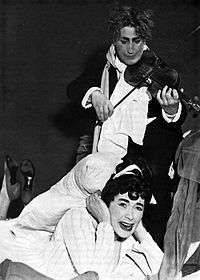Elisabeth Söderström

Elisabeth Anna Söderström CBE (7 May 1927 – 20 November 2009) was a Swedish soprano who performed both opera and song, and was known as a leading interpreter of the works of Janáček, Rachmaninov and Sibelius.[1] She was particularly well known for her recordings of the lead soprano roles in the three Janáček operas Jenůfa, Káťa Kabanová, and The Makropoulos Affair, all of which received Gramophone Awards.[2] The Gramophone critic John Warrack described her portrayal of Káťa Kabanová as "establishing by an infinity of subtle touches and discreet, sensitive singing the picture of Káta as the richest and most human character in the drama."[3]
Career


Born in Stockholm, Söderström received her first musical schooling from Adelaide von Skilondz and later studied at the Royal Academy of Music in Stockholm. She made her debut in 1947 at the Drottningholm Palace Theatre singing in one of Mozart's lesser-known works Bastien et Bastienne.[4] From 1949 to 1980 she called the Royal Swedish Opera her home but she frequently appeared at some of the largest opera houses in the world. She was also a regular visitor to the recording studio. Between 1959 and 1964 Söderström was contracted by the Metropolitan Opera in New York to which she would return in 1983-87. Her last stage performance was in 1999 in Tchaikovsky's The Queen of Spades at the Metropolitan Opera. In 1978 she created the role of Amanda/Clitoria in György Ligeti's Le Grand Macabre at the Royal Swedish Opera.
During her long career, Söderström made a name for herself as a technically perfect and at the same time warm soprano with a personal style which allowed her to sing in a wide variety of different works ranging from 17th century to contemporary. Between appearances in fully staged operas, Söderström gave numerous concerts and recitals in all corners of the world.[5] She made a variety of recordings, including the complete songs of Sergei Rachmaninoff, accompanied by Vladimir Ashkenazy.
Between 1993 and 1996 Söderström was the director of the Drottningholm Palace Theatre, the very stage where she had made her debut almost 50 years earlier.[4] In 1983 under the baton of James Levine, she sang the final trio from Strauss's Rosenkavalier with Kathleen Battle and Frederica von Stade at the Metropolitan's Centennial Gala.[6]
In 1978 she published a short of stories from her career and thoughts on performing entitled 'I min tonart'; this was translated in English as 'In My Own Key'.[7]
Personal life
Elisabeth Söderström was married to commander Sverker Olow from 1950 until her death.[1] They lived in Lidingö.
Death
She died in the Swedish capital, Stockholm, on 20 November 2009, aged 82, from complications from a stroke.[8]
Honours
Elisabeth Söderström received a number of honours, both in Sweden and abroad. Among them:
- 1959 - the Italian Order of the Star of Italian Solidarity[9]
- 1969 - the Swedish Commander of the Royal Order of Vasa[9]
- 1973 - the French Commandeur de l´Ordre des Arts et Lettres[9]
- 1985 - the British Commander of the Most Excellent Order of the British Empire[9]
- 1997 - one of the Eurostar locomotives was named after her[6]
References
- 1 2 Elizabeth Sleeman, International Who's Who 2004, Routledge, 2003. p. 1579. ISBN 1-85743-217-7
- ↑ Jolly, James. "Obituary. Elisabeth Söderström." Gramophone, January 2010, p. 9.
- ↑ Warrack, John. Gramophone, October 1989, p. 743. Retrieved 17 January 2009.
- 1 2 Tommasini, Anthony (22 November 2009). "Elisabeth Soderstrom, Swedish Soprano, Dies at 82". New York Times (New York). Retrieved 29 November 2009.
- ↑ Blyth, Alan (21 November 2009). "Elisabeth Söderström obituary". The Guardian (London). Retrieved 21 November 2009.
- 1 2 "Elisabeth Söderström". Telegraph (London). 22 November 2009. Retrieved 29 November 2009.
- ↑ In My Own Key, translated from Swedish by Joan Tate. Hamish Hamilton, London, 1979.
- ↑ "Swedish Soprano Elisabeth Söderström dies at 82". The Associated Press. 20 November 2009. Retrieved 21 November 2009.
- 1 2 3 4 International Who's Who in Music
External links
- An interview with Elisabeth Söderström recorded in 1992 - a British Library sound recording
|